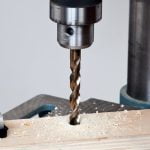Woodworking routers are essential tools for any woodworking enthusiast, allowing for precision and versatility in shaping and cutting wood. Whether you’re a beginner looking to start your woodworking journey or an experienced craftsman seeking to upgrade your tools, understanding what makes a good woodworking router is crucial.
When it comes to choosing the right woodworking router, there are various factors to consider, including the type of router that best suits your needs. Fixed base and plunge routers are two popular options, each with its own advantages and applications. Fixed base routers provide stability and control for tasks like edge profiling and dado cuts, while plunge routers offer flexibility for tasks that require depth adjustments while cutting.
In this article, we will explore the key features to look for when buying a woodworking router, compare different models on the market, and provide recommendations for the best routers suited for beginners, intermediate users, and advanced craftsmen. By understanding what sets a good woodworking router apart from the rest, you can make an informed decision to enhance your woodworking projects.
Types of Woodworking Routers
Woodworking routers are essential tools for any woodworker, allowing for precise cuts, grooves, and designs in wooden pieces. When looking to purchase a woodworking router, one of the key decisions to make is whether to opt for a fixed base or plunge router. Each type has its own set of advantages and specific uses that cater to different woodworking needs.
Fixed base routers are more commonly used for tasks that require consistent depth cuts, such as dadoes or rabbit joints. They offer stability and accuracy when working on edges and can be easily adjusted for different cutting depths. On the other hand, plunge routers provide versatility by allowing the user to lower the bit into the wood while it is already in motion. This makes them ideal for tasks like engraving or making interior cut-outs.
When deciding what is a good woodworking router to buy, it’s important to consider your specific woodworking projects and needs. If you mainly work on projects that require precise routing at a constant depth, a fixed base router may be the better choice.
However, if you need a router that offers more flexibility and control for various applications, a plunge router might be more suitable. Ultimately, the decision between fixed base and plunge routers will depend on the type of projects you typically work on and your level of experience with using woodworking tools.
| Woodworking Router Type | Best For |
|---|---|
| Fixed Base Router | Consistent depth cuts like dadoes or rabbit joints |
| Plunge Router | Versatility for tasks like engraving or making interior cut-outs |
Key Features to Consider When Buying a Woodworking Router
When considering what is a good woodworking router to buy, it is crucial to pay attention to the key features that will best suit your needs and skill level. Here are some important factors to consider when making your decision:
- Router Type: As mentioned earlier in the article, there are fixed base routers and plunge routers. Fixed base routers are typically more stable and precise for basic routing tasks, while plunge routers offer versatility for different cutting depths.
- Power: The power of a woodworking router is measured in horsepower (HP) or amps. Higher power routers are ideal for heavy-duty tasks and hardwoods, while lower power routers are suitable for lighter projects.
- Variable Speed: Look for a router with variable speed settings to adjust the RPM (revolutions per minute) based on the material you are working with. This feature allows for greater control and precision during routing.
Considering these key features will help you narrow down your choices when looking for what is a good woodworking router to buy. Different models and brands offer varying specifications, so understanding your specific needs will guide you towards the best option for your woodworking projects.
When researching woodworking routers, make sure to read reviews from other users and professional woodworkers to get a sense of performance, durability, and overall satisfaction with the product. Additionally, consider your budget constraints and how often you plan on using the router to determine the most cost-effective option that meets your requirements.
Lastly, don’t forget about additional accessories and attachments that may be compatible with your chosen router model. These can enhance the capabilities of your router and improve its versatility for different woodworking applications. Prioritizing these key features will ensure that you make an informed decision when investing in a new woodworking router.
Comparison of Different Woodworking Router Models
If you are in the market for a new woodworking router, it is essential to compare different models to determine which one best suits your needs. With a wide range of options available, each with its own unique features and capabilities, choosing the right woodworking router can make a significant impact on the quality of your projects. In this section, we will explore and compare some popular woodworking router models to help you make an informed decision.
Compact Router Models
Compact routers are lightweight and versatile tools that are perfect for intricate work such as trim routing, edge profiling, and laminate trimming. One popular compact model is the DeWalt DWP611PK Compact Router, known for its variable speed control, easy depth adjustment system, and comfortable grip design. Another top contender in this category is the Bosch Colt Palm Grip PR20EVSK Router, which offers smooth operation, compact size for maneuverability, and precise depth adjustments.
Mid-Sized Router Models
For more extensive projects requiring both power and precision, mid-sized routers are a great option. The Makita RT0701C Compact Router is a favorite among woodworkers for its powerful 1-1/4 HP motor, electronic speed control for constant speed under load, and smooth rack-and-pinion fine depth adjustment system. Another solid choice in this category is the Porter-Cable 690LR Fixed-Base Router with its durable construction, reliable performance, and affordable price point.
Plunge Router Models
Plunge routers are ideal for tasks like cutting dadoes or creating mortises where precision and control are key. The Bosch 1617EVSPK Plunge and Fixed-Base Router Kit is a popular choice due to its versatility in both handheld or table-mounted use, powerful 2.25 HP motor, and precise depth adjustments. The Festool 574692 OF1400 EQ Impression Plunge Router is another high-end option with exceptional dust extraction capabilities, smooth plunge action, and micro-adjustable depth controls.
By comparing these different woodworking router models based on their features, capabilities, and user reviews, you can determine which one aligns best with your woodworking needs and skill level. Remember to consider factors such as power output, adjustability options, ergonomic design, brand reliability, warranty coverage when making your decision on what is a good woodworking router to buy.
Best Woodworking Routers for Beginners
When it comes to starting out in woodworking, choosing the right tools is essential. One of the most versatile and useful tools for beginners is a woodworking router. But with so many options available on the market, it can be overwhelming to decide which one to buy. So, what is a good woodworking router to buy for beginners?
For beginners, a good woodworking router should be user-friendly, reliable, and offer versatility for various projects. One highly recommended option is the DEWALT DWP611 Compact Router. This compact yet powerful router is easy to handle and control, making it ideal for those who are new to woodworking. It also features variable speed control, allowing users to adjust the speed based on their project requirements.
Another great option for beginners is the Bosch Colt Palm Grip PR20EVS Router. This palm-grip router is lightweight and comfortable to use, making it perfect for those just starting out in woodworking. It also offers smooth and precise cuts, along with adjustable depth settings for added versatility in projects. Both of these routers come highly recommended for beginners looking to invest in a quality tool that will grow with them as they master their woodworking skills.
Best Woodworking Routers for Intermediate Users
Woodworking routers are essential tools for any woodworking enthusiast, and as an intermediate user, you may be looking to upgrade to a more advanced router that can handle a variety of tasks. When considering what is a good woodworking router to buy at this stage, there are several factors to keep in mind to ensure you get the best tool for your needs.
Here are some top woodworking routers that are recommended for intermediate users:
- DEWALT DWP611PK Compact Router – This compact router is known for its precision and versatility, making it a great choice for intermediate woodworkers who want a reliable tool for intricate projects.
- Bosch 1617EVSPK Wood Router – With its powerful motor and variable speed control, this router is ideal for tackling a wide range of woodworking tasks with ease.
- Makita RT0701C Compact Router – Another compact option, this router offers smooth cutting performance and ergonomic design, perfect for intermediate users working on detailed projects.
These routers offer a good balance of power, control, and versatility, making them great choices for those looking to take their woodworking skills to the next level. Be sure to consider your specific project needs and preferences when choosing the best woodworking router for your skill level.
Best Woodworking Routers for Advanced Users
For advanced users in the world of woodworking, having a high-quality and versatile router is essential to tackle more complex projects with precision and efficiency. When considering what is a good woodworking router to buy for advanced users, it’s important to look for routers that offer powerful performance, advanced features, and durability to handle heavy-duty tasks.
High-Powered Router Models
Advanced woodworkers often require routers with high horsepower for demanding applications such as intricate wood carving or working on dense hardwoods. Models like the Festool OF 2200 EB-Plus 2-1/4 HP Router or the Makita RP2301FC 3-1/4 HP Plunge Router are popular choices among experienced users due to their robust motors and precision control features.
Variable Speed Control
Another crucial feature to look for in a woodworking router for advanced users is variable speed control. This allows for greater flexibility when working with different types of materials or making specific cuts. Routers like the Bosch 1617EVSPK Variable Speed Router Kit offer adjustable speeds ranging from 8,000 to 25,000 RPM, enabling users to customize their cutting experience based on the task at hand.
Advanced Fence Systems
Advanced users often require precise routing capabilities, making an advanced fence system a crucial consideration when choosing a woodworking router. Models like the Triton TRA001 3-1/4 HP Dual Mode Precision Plunge Router come equipped with micro-adjustable fence systems that provide optimal control and accuracy during intricate routing tasks. Additionally, features like dust extraction ports and LED lights can further enhance visibility and cleanliness while working on challenging projects.
When looking for the best woodworking router for advanced users, it’s essential to prioritize performance, versatility, and durability. By selecting a router with high horsepower, variable speed control, and advanced fence systems, experienced woodworkers can elevate their craftsmanship and take on more challenging projects with confidence.
Tips for Maintaining and Caring for Your Woodworking Router
For those who are new to the world of woodworking or even seasoned professionals, knowing what is a good woodworking router to buy can make all the difference in your projects. As you navigate through the myriad of options available in the market, it’s essential to also consider how to maintain and care for your woodworking router to ensure its longevity and optimal performance.
One key aspect of maintaining your woodworking router is keeping it clean and free of dust and debris. Regularly cleaning the motor vents, brushes, collets, and bits can prevent build-up that may affect the functionality of your tool. Additionally, lubricating moving parts like the depth adjustment mechanism and bearings will help prolong the life of your woodworking router.
Another important tip for caring for your woodworking router is storing it properly when not in use. Keeping it in a dry and clean environment away from extreme temperatures can prevent rusting or damage. Investing in a protective case or bag specifically designed for routers can also help safeguard it from accidental bumps or falls.
By following these maintenance practices, you can ensure that your chosen woodworking router continues to deliver exceptional results for years to come. So remember when selecting an option for what is a good woodworking router to buy also think about how you plan to care for it in order to maximize its lifespan.
Frequently Asked Questions
What Is the Best Wood Router for DIY?
The best wood router for DIY projects would depend on the specific needs of the user. However, a versatile and user-friendly option like a compact plunge router with adjustable speeds and depth settings is often recommended for beginners and experienced DIYers alike.
How Big of a Router Do I Need for Woodworking?
When determining how big of a router you need for woodworking, it’s essential to consider the size of the projects you typically work on. For smaller-scale tasks like making trim or signs, a compact handheld router with 1-1.5 HP may suffice.
However, larger projects or heavy-duty tasks like cabinetry may require a more powerful router with 2-3 HP.
What Is the Easiest Wood Router to Use?
The easiest wood router to use for beginners is usually a fixed-base router due to its simplicity and stability during operation. Models with ergonomic grips, intuitive depth adjustments, and clear visibility of the cutting area can make the learning curve less intimidating for those new to woodworking tools.

Hi everyone! I’m a woodworker and blogger, and this is my woodworking blog. In my blog, I share tips and tricks for woodworkers of all skill levels, as well as project ideas that you can try yourself.





